Accounting Theories and Lease Accounting: A Comprehensive Study
VerifiedAdded on 2019/11/19
|7
|1360
|149
Homework Assignment
AI Summary
This document offers a comprehensive study of accounting theories, focusing on legitimacy and stakeholder theory, and their practical applications. It explores how accounting theories shape accounting practices and principles, evaluating their relevance to social and environmental accounting. The paper then delves into lease accounting, differentiating between operating and financial leases, and analyzing the potential impact of changing accounting standards on organizations and financial institutions. The assignment also examines the implications of these changes, particularly concerning debt covenants and lobbying efforts by financial institutions. This analysis provides a valuable overview of key concepts in accounting and finance.
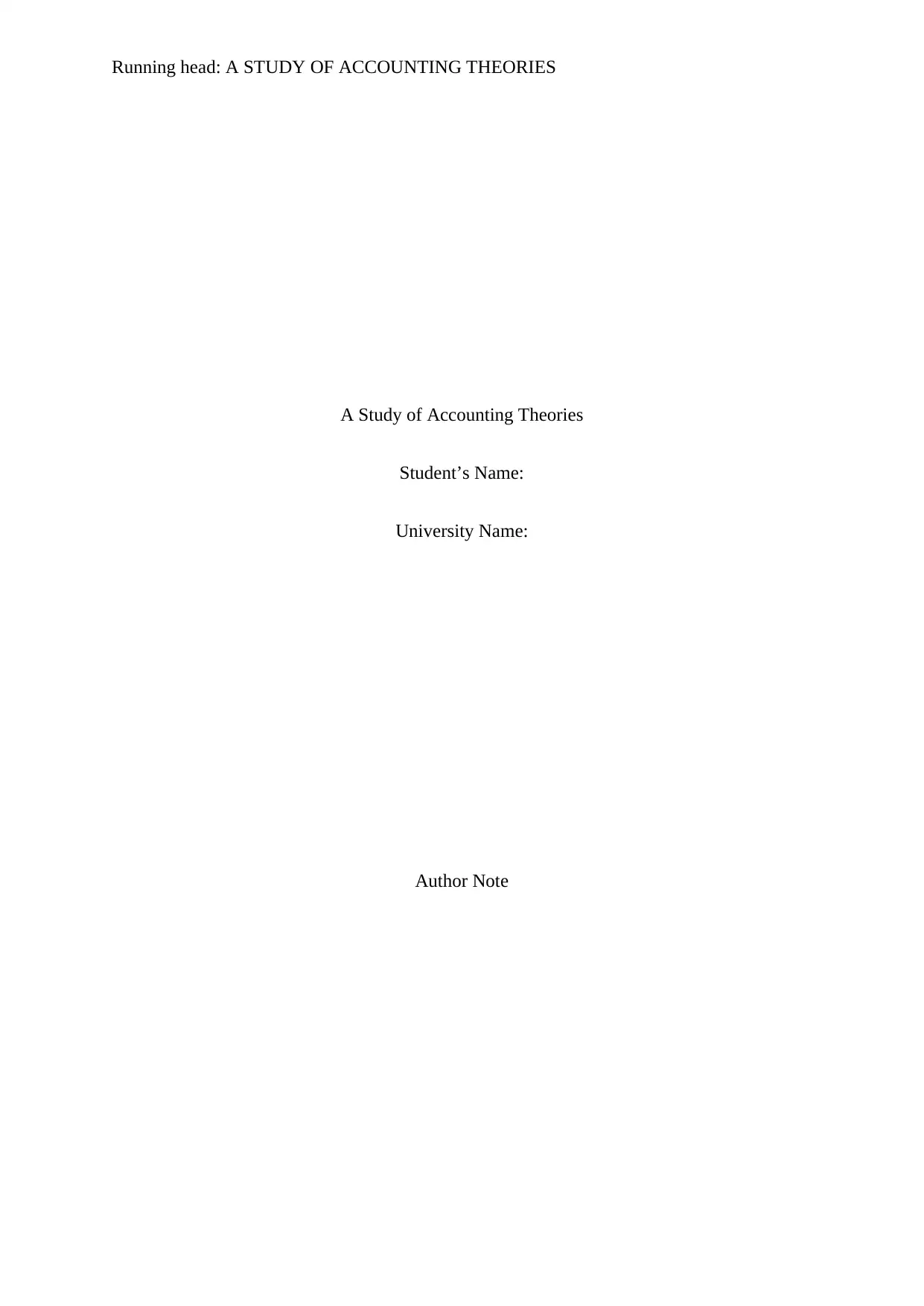
Running head: A STUDY OF ACCOUNTING THEORIES
A Study of Accounting Theories
Student’s Name:
University Name:
Author Note
A Study of Accounting Theories
Student’s Name:
University Name:
Author Note
Paraphrase This Document
Need a fresh take? Get an instant paraphrase of this document with our AI Paraphraser
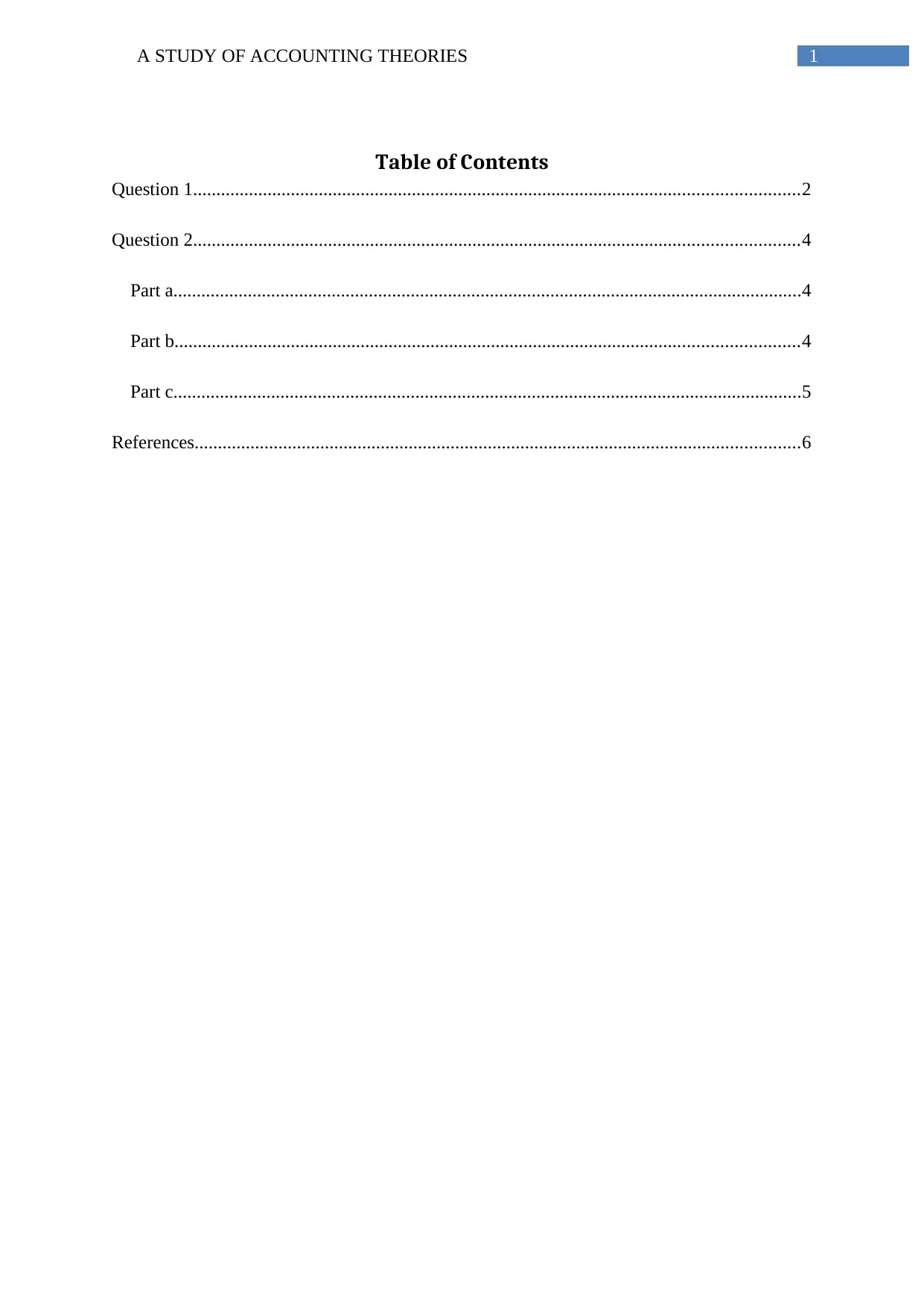
1A STUDY OF ACCOUNTING THEORIES
Table of Contents
Question 1..................................................................................................................................2
Question 2..................................................................................................................................4
Part a.......................................................................................................................................4
Part b......................................................................................................................................4
Part c.......................................................................................................................................5
References..................................................................................................................................6
Table of Contents
Question 1..................................................................................................................................2
Question 2..................................................................................................................................4
Part a.......................................................................................................................................4
Part b......................................................................................................................................4
Part c.......................................................................................................................................5
References..................................................................................................................................6
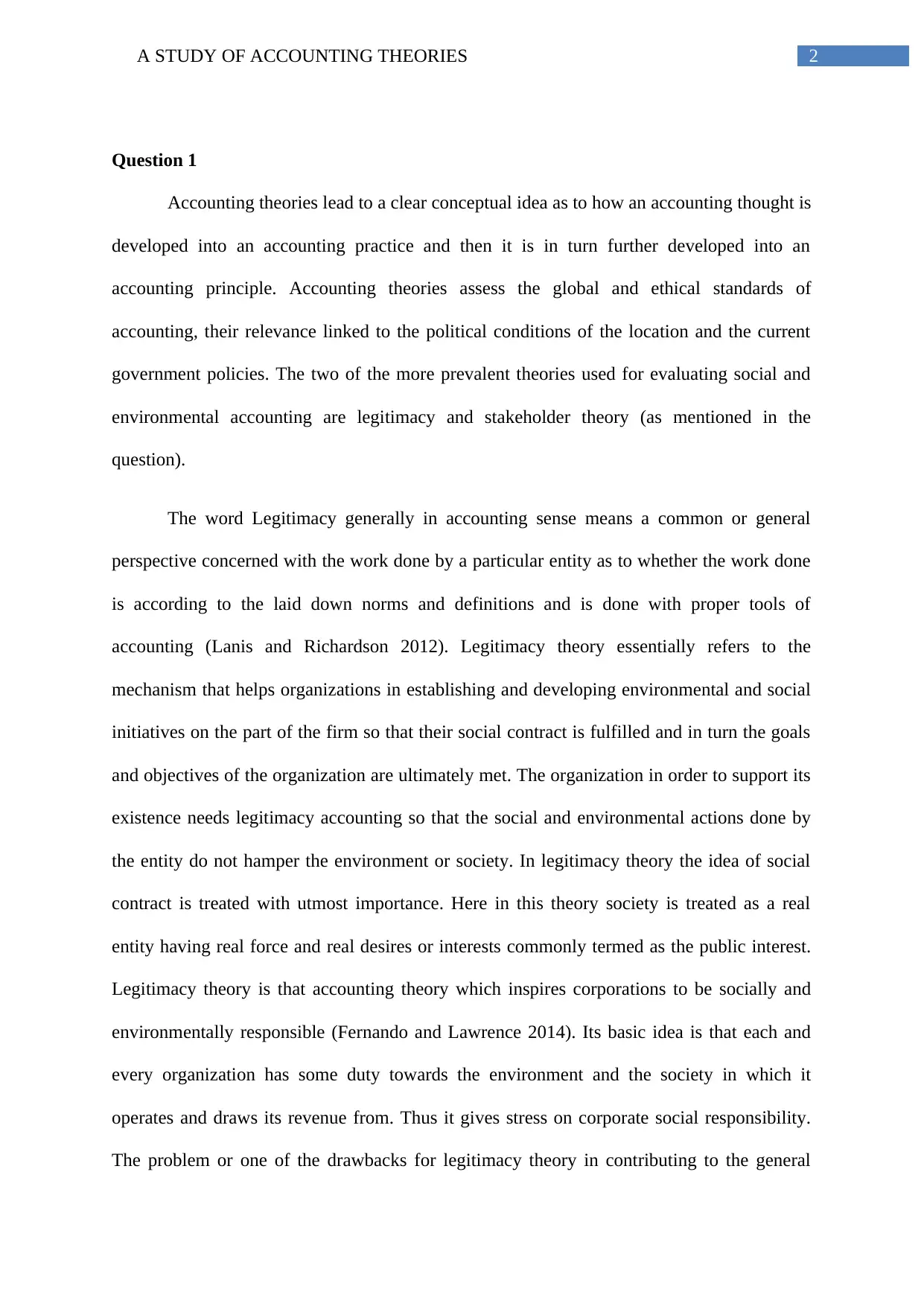
2A STUDY OF ACCOUNTING THEORIES
Question 1
Accounting theories lead to a clear conceptual idea as to how an accounting thought is
developed into an accounting practice and then it is in turn further developed into an
accounting principle. Accounting theories assess the global and ethical standards of
accounting, their relevance linked to the political conditions of the location and the current
government policies. The two of the more prevalent theories used for evaluating social and
environmental accounting are legitimacy and stakeholder theory (as mentioned in the
question).
The word Legitimacy generally in accounting sense means a common or general
perspective concerned with the work done by a particular entity as to whether the work done
is according to the laid down norms and definitions and is done with proper tools of
accounting (Lanis and Richardson 2012). Legitimacy theory essentially refers to the
mechanism that helps organizations in establishing and developing environmental and social
initiatives on the part of the firm so that their social contract is fulfilled and in turn the goals
and objectives of the organization are ultimately met. The organization in order to support its
existence needs legitimacy accounting so that the social and environmental actions done by
the entity do not hamper the environment or society. In legitimacy theory the idea of social
contract is treated with utmost importance. Here in this theory society is treated as a real
entity having real force and real desires or interests commonly termed as the public interest.
Legitimacy theory is that accounting theory which inspires corporations to be socially and
environmentally responsible (Fernando and Lawrence 2014). Its basic idea is that each and
every organization has some duty towards the environment and the society in which it
operates and draws its revenue from. Thus it gives stress on corporate social responsibility.
The problem or one of the drawbacks for legitimacy theory in contributing to the general
Question 1
Accounting theories lead to a clear conceptual idea as to how an accounting thought is
developed into an accounting practice and then it is in turn further developed into an
accounting principle. Accounting theories assess the global and ethical standards of
accounting, their relevance linked to the political conditions of the location and the current
government policies. The two of the more prevalent theories used for evaluating social and
environmental accounting are legitimacy and stakeholder theory (as mentioned in the
question).
The word Legitimacy generally in accounting sense means a common or general
perspective concerned with the work done by a particular entity as to whether the work done
is according to the laid down norms and definitions and is done with proper tools of
accounting (Lanis and Richardson 2012). Legitimacy theory essentially refers to the
mechanism that helps organizations in establishing and developing environmental and social
initiatives on the part of the firm so that their social contract is fulfilled and in turn the goals
and objectives of the organization are ultimately met. The organization in order to support its
existence needs legitimacy accounting so that the social and environmental actions done by
the entity do not hamper the environment or society. In legitimacy theory the idea of social
contract is treated with utmost importance. Here in this theory society is treated as a real
entity having real force and real desires or interests commonly termed as the public interest.
Legitimacy theory is that accounting theory which inspires corporations to be socially and
environmentally responsible (Fernando and Lawrence 2014). Its basic idea is that each and
every organization has some duty towards the environment and the society in which it
operates and draws its revenue from. Thus it gives stress on corporate social responsibility.
The problem or one of the drawbacks for legitimacy theory in contributing to the general
⊘ This is a preview!⊘
Do you want full access?
Subscribe today to unlock all pages.

Trusted by 1+ million students worldwide
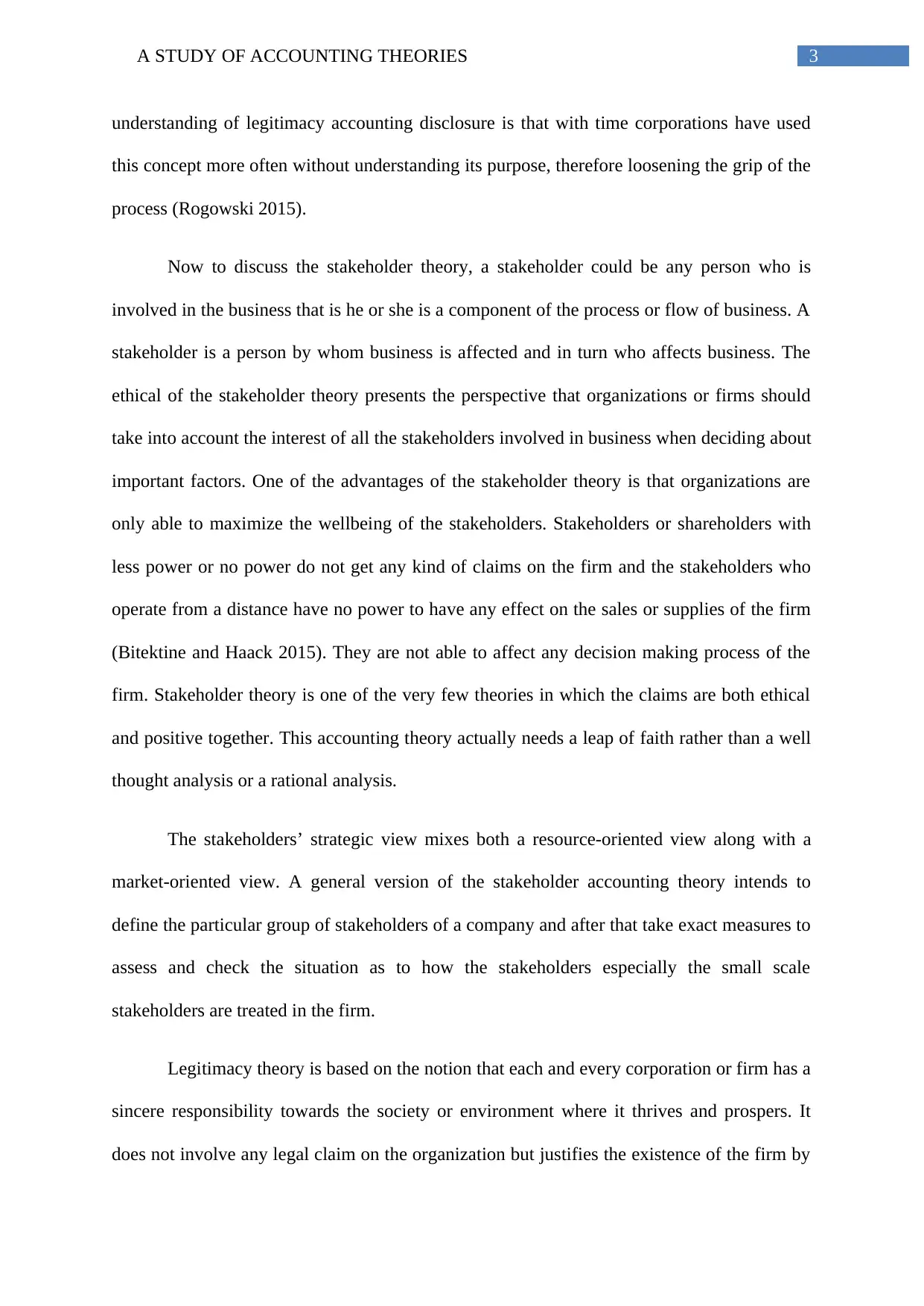
3A STUDY OF ACCOUNTING THEORIES
understanding of legitimacy accounting disclosure is that with time corporations have used
this concept more often without understanding its purpose, therefore loosening the grip of the
process (Rogowski 2015).
Now to discuss the stakeholder theory, a stakeholder could be any person who is
involved in the business that is he or she is a component of the process or flow of business. A
stakeholder is a person by whom business is affected and in turn who affects business. The
ethical of the stakeholder theory presents the perspective that organizations or firms should
take into account the interest of all the stakeholders involved in business when deciding about
important factors. One of the advantages of the stakeholder theory is that organizations are
only able to maximize the wellbeing of the stakeholders. Stakeholders or shareholders with
less power or no power do not get any kind of claims on the firm and the stakeholders who
operate from a distance have no power to have any effect on the sales or supplies of the firm
(Bitektine and Haack 2015). They are not able to affect any decision making process of the
firm. Stakeholder theory is one of the very few theories in which the claims are both ethical
and positive together. This accounting theory actually needs a leap of faith rather than a well
thought analysis or a rational analysis.
The stakeholders’ strategic view mixes both a resource-oriented view along with a
market-oriented view. A general version of the stakeholder accounting theory intends to
define the particular group of stakeholders of a company and after that take exact measures to
assess and check the situation as to how the stakeholders especially the small scale
stakeholders are treated in the firm.
Legitimacy theory is based on the notion that each and every corporation or firm has a
sincere responsibility towards the society or environment where it thrives and prospers. It
does not involve any legal claim on the organization but justifies the existence of the firm by
understanding of legitimacy accounting disclosure is that with time corporations have used
this concept more often without understanding its purpose, therefore loosening the grip of the
process (Rogowski 2015).
Now to discuss the stakeholder theory, a stakeholder could be any person who is
involved in the business that is he or she is a component of the process or flow of business. A
stakeholder is a person by whom business is affected and in turn who affects business. The
ethical of the stakeholder theory presents the perspective that organizations or firms should
take into account the interest of all the stakeholders involved in business when deciding about
important factors. One of the advantages of the stakeholder theory is that organizations are
only able to maximize the wellbeing of the stakeholders. Stakeholders or shareholders with
less power or no power do not get any kind of claims on the firm and the stakeholders who
operate from a distance have no power to have any effect on the sales or supplies of the firm
(Bitektine and Haack 2015). They are not able to affect any decision making process of the
firm. Stakeholder theory is one of the very few theories in which the claims are both ethical
and positive together. This accounting theory actually needs a leap of faith rather than a well
thought analysis or a rational analysis.
The stakeholders’ strategic view mixes both a resource-oriented view along with a
market-oriented view. A general version of the stakeholder accounting theory intends to
define the particular group of stakeholders of a company and after that take exact measures to
assess and check the situation as to how the stakeholders especially the small scale
stakeholders are treated in the firm.
Legitimacy theory is based on the notion that each and every corporation or firm has a
sincere responsibility towards the society or environment where it thrives and prospers. It
does not involve any legal claim on the organization but justifies the existence of the firm by
Paraphrase This Document
Need a fresh take? Get an instant paraphrase of this document with our AI Paraphraser
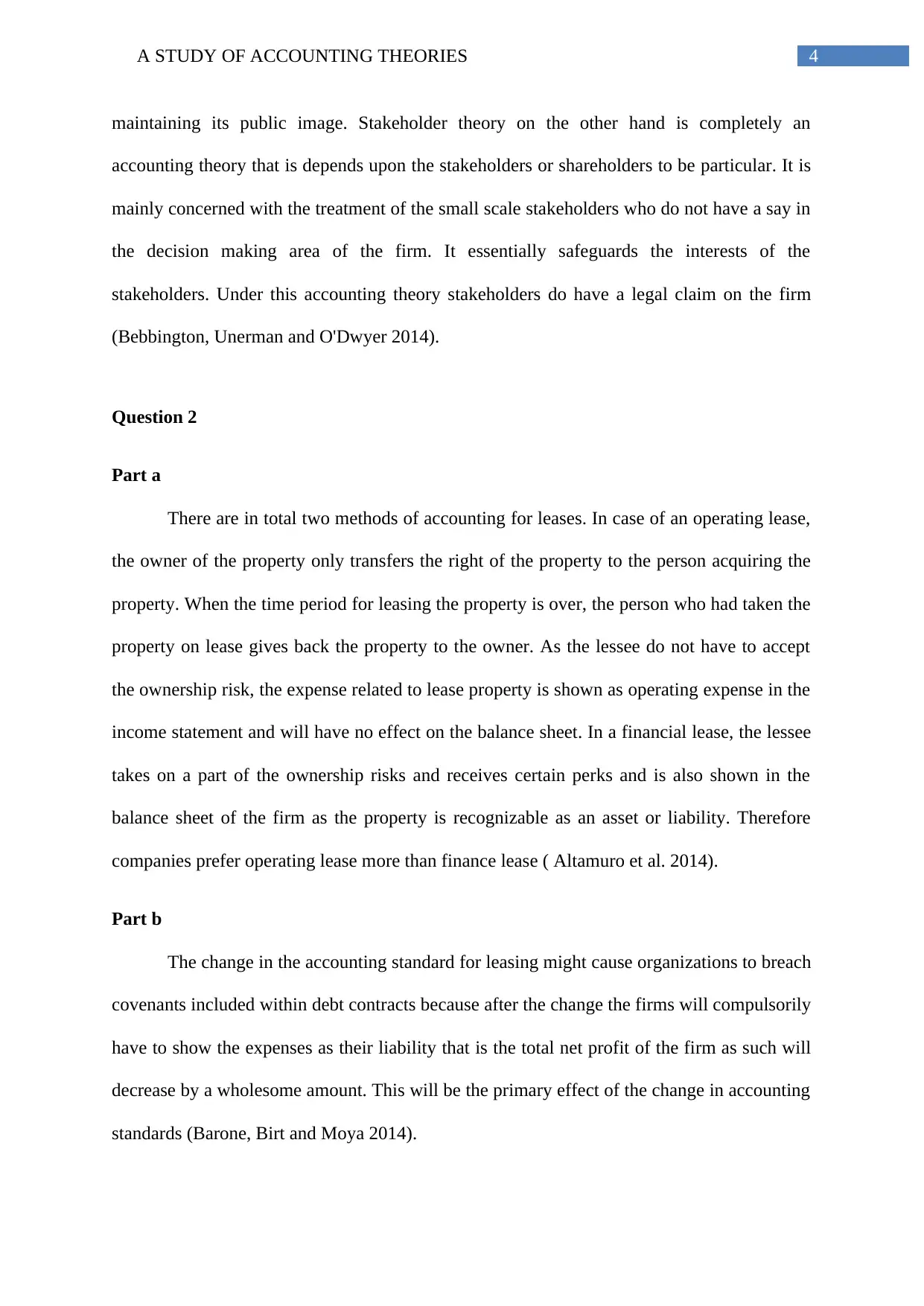
4A STUDY OF ACCOUNTING THEORIES
maintaining its public image. Stakeholder theory on the other hand is completely an
accounting theory that is depends upon the stakeholders or shareholders to be particular. It is
mainly concerned with the treatment of the small scale stakeholders who do not have a say in
the decision making area of the firm. It essentially safeguards the interests of the
stakeholders. Under this accounting theory stakeholders do have a legal claim on the firm
(Bebbington, Unerman and O'Dwyer 2014).
Question 2
Part a
There are in total two methods of accounting for leases. In case of an operating lease,
the owner of the property only transfers the right of the property to the person acquiring the
property. When the time period for leasing the property is over, the person who had taken the
property on lease gives back the property to the owner. As the lessee do not have to accept
the ownership risk, the expense related to lease property is shown as operating expense in the
income statement and will have no effect on the balance sheet. In a financial lease, the lessee
takes on a part of the ownership risks and receives certain perks and is also shown in the
balance sheet of the firm as the property is recognizable as an asset or liability. Therefore
companies prefer operating lease more than finance lease ( Altamuro et al. 2014).
Part b
The change in the accounting standard for leasing might cause organizations to breach
covenants included within debt contracts because after the change the firms will compulsorily
have to show the expenses as their liability that is the total net profit of the firm as such will
decrease by a wholesome amount. This will be the primary effect of the change in accounting
standards (Barone, Birt and Moya 2014).
maintaining its public image. Stakeholder theory on the other hand is completely an
accounting theory that is depends upon the stakeholders or shareholders to be particular. It is
mainly concerned with the treatment of the small scale stakeholders who do not have a say in
the decision making area of the firm. It essentially safeguards the interests of the
stakeholders. Under this accounting theory stakeholders do have a legal claim on the firm
(Bebbington, Unerman and O'Dwyer 2014).
Question 2
Part a
There are in total two methods of accounting for leases. In case of an operating lease,
the owner of the property only transfers the right of the property to the person acquiring the
property. When the time period for leasing the property is over, the person who had taken the
property on lease gives back the property to the owner. As the lessee do not have to accept
the ownership risk, the expense related to lease property is shown as operating expense in the
income statement and will have no effect on the balance sheet. In a financial lease, the lessee
takes on a part of the ownership risks and receives certain perks and is also shown in the
balance sheet of the firm as the property is recognizable as an asset or liability. Therefore
companies prefer operating lease more than finance lease ( Altamuro et al. 2014).
Part b
The change in the accounting standard for leasing might cause organizations to breach
covenants included within debt contracts because after the change the firms will compulsorily
have to show the expenses as their liability that is the total net profit of the firm as such will
decrease by a wholesome amount. This will be the primary effect of the change in accounting
standards (Barone, Birt and Moya 2014).
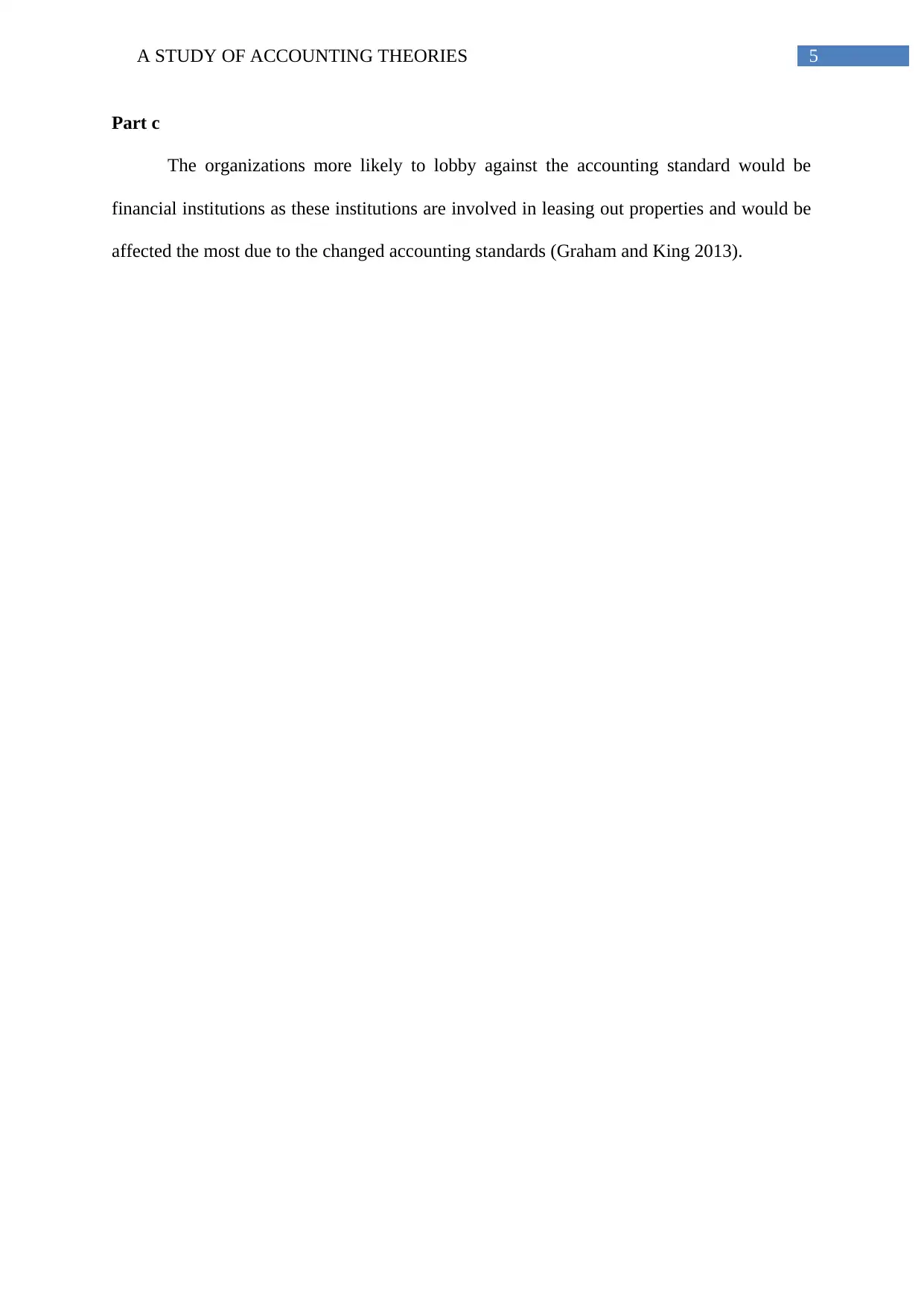
5A STUDY OF ACCOUNTING THEORIES
Part c
The organizations more likely to lobby against the accounting standard would be
financial institutions as these institutions are involved in leasing out properties and would be
affected the most due to the changed accounting standards (Graham and King 2013).
Part c
The organizations more likely to lobby against the accounting standard would be
financial institutions as these institutions are involved in leasing out properties and would be
affected the most due to the changed accounting standards (Graham and King 2013).
⊘ This is a preview!⊘
Do you want full access?
Subscribe today to unlock all pages.

Trusted by 1+ million students worldwide
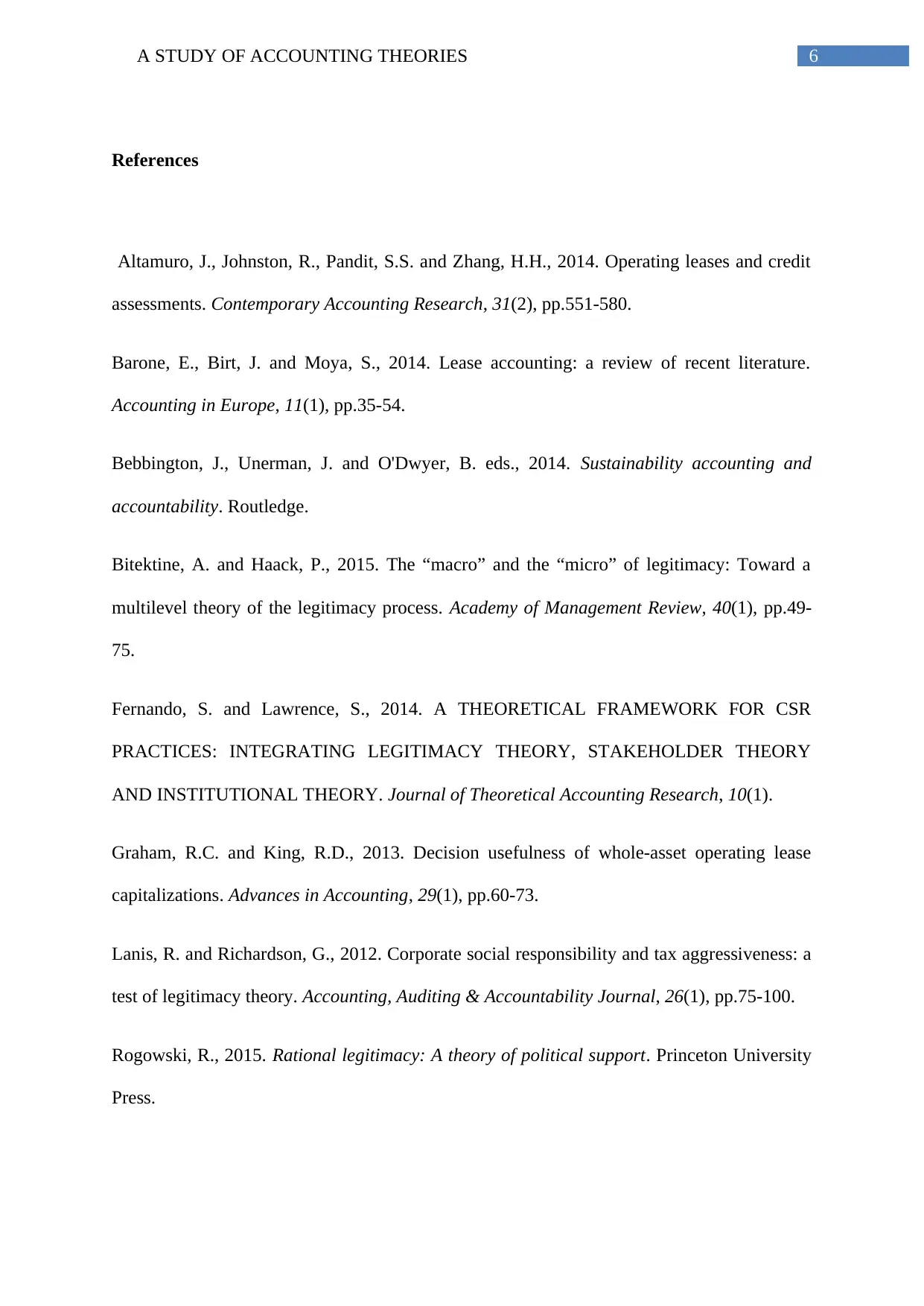
6A STUDY OF ACCOUNTING THEORIES
References
Altamuro, J., Johnston, R., Pandit, S.S. and Zhang, H.H., 2014. Operating leases and credit
assessments. Contemporary Accounting Research, 31(2), pp.551-580.
Barone, E., Birt, J. and Moya, S., 2014. Lease accounting: a review of recent literature.
Accounting in Europe, 11(1), pp.35-54.
Bebbington, J., Unerman, J. and O'Dwyer, B. eds., 2014. Sustainability accounting and
accountability. Routledge.
Bitektine, A. and Haack, P., 2015. The “macro” and the “micro” of legitimacy: Toward a
multilevel theory of the legitimacy process. Academy of Management Review, 40(1), pp.49-
75.
Fernando, S. and Lawrence, S., 2014. A THEORETICAL FRAMEWORK FOR CSR
PRACTICES: INTEGRATING LEGITIMACY THEORY, STAKEHOLDER THEORY
AND INSTITUTIONAL THEORY. Journal of Theoretical Accounting Research, 10(1).
Graham, R.C. and King, R.D., 2013. Decision usefulness of whole-asset operating lease
capitalizations. Advances in Accounting, 29(1), pp.60-73.
Lanis, R. and Richardson, G., 2012. Corporate social responsibility and tax aggressiveness: a
test of legitimacy theory. Accounting, Auditing & Accountability Journal, 26(1), pp.75-100.
Rogowski, R., 2015. Rational legitimacy: A theory of political support. Princeton University
Press.
References
Altamuro, J., Johnston, R., Pandit, S.S. and Zhang, H.H., 2014. Operating leases and credit
assessments. Contemporary Accounting Research, 31(2), pp.551-580.
Barone, E., Birt, J. and Moya, S., 2014. Lease accounting: a review of recent literature.
Accounting in Europe, 11(1), pp.35-54.
Bebbington, J., Unerman, J. and O'Dwyer, B. eds., 2014. Sustainability accounting and
accountability. Routledge.
Bitektine, A. and Haack, P., 2015. The “macro” and the “micro” of legitimacy: Toward a
multilevel theory of the legitimacy process. Academy of Management Review, 40(1), pp.49-
75.
Fernando, S. and Lawrence, S., 2014. A THEORETICAL FRAMEWORK FOR CSR
PRACTICES: INTEGRATING LEGITIMACY THEORY, STAKEHOLDER THEORY
AND INSTITUTIONAL THEORY. Journal of Theoretical Accounting Research, 10(1).
Graham, R.C. and King, R.D., 2013. Decision usefulness of whole-asset operating lease
capitalizations. Advances in Accounting, 29(1), pp.60-73.
Lanis, R. and Richardson, G., 2012. Corporate social responsibility and tax aggressiveness: a
test of legitimacy theory. Accounting, Auditing & Accountability Journal, 26(1), pp.75-100.
Rogowski, R., 2015. Rational legitimacy: A theory of political support. Princeton University
Press.
1 out of 7
Related Documents
Your All-in-One AI-Powered Toolkit for Academic Success.
+13062052269
info@desklib.com
Available 24*7 on WhatsApp / Email
![[object Object]](/_next/static/media/star-bottom.7253800d.svg)
Unlock your academic potential
Copyright © 2020–2026 A2Z Services. All Rights Reserved. Developed and managed by ZUCOL.




